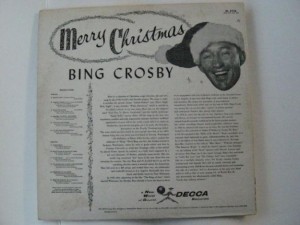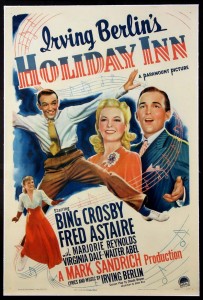Music Charts Magazine History
- Song for the month of December 2013:
Bing Crosby - "White Christmas"
"White Christmas" is an Irving Berlin song reminiscing about an old-fashioned Christmas setting. According to the Guinness Book of World Records, the version sung by Bing Crosby is the best-selling single of all time, with estimated sales in excess of 50 million copies worldwide.
Accounts vary as to when and where Berlin wrote the song. One story is that he wrote it in 1940, in warm La Quinta, California, while staying at the La Quinta Hotel, a frequent Hollywood retreat also favored by writer-producer Frank Capra, although the Arizona Biltmore also claims the song was written there. He often stayed up all night writing — he told his secretary, "Grab your pen and take down this song. I just wrote the best song I've ever written — heck, I just wrote the best song that anybody's ever written!"
The first public performance of the song was by Bing Crosby, on his NBC radio show The Kraft Music Hall on Christmas Day, 1941; a copy of the recording from the radio program is owned by the estate of Bing Crosby and was loaned to CBS Sunday Morning for their December 25, 2011, program. He subsequently recorded the song with the John Scott Trotter Orchestra and the Ken Darby Singers for Decca Records in just 18 minutes on May 29, 1942, and it was released on July 30 as part of an album of six 78-rpm songs from the film Holiday Inn. At first, Crosby did not see anything special about the song. He just said "I don't think we have any problems with that one, Irving."
The song initially performed poorly and was overshadowed by Holiday Inn's first hit song: "Be Careful, It's my Heart". By the end of October 1942, however, "White Christmas" topped the "Your Hit Parade" chart. It remained in that position until well into the new year. (It has often been noted that the mix of melancholy — "just like the ones I used to know" — with comforting images of home — "where the treetops glisten" — resonated especially strongly with listeners during World War II. The Armed Forces Network was flooded with requests for the song. The song is noted for Crosby's whistling during the second Chorus.)
In 1942 alone, Crosby's recording spent eleven weeks on top of the Billboard charts. The original version also hit number one on the Harlem Hit Parade for three weeks, Crosby's first-ever appearance on the black-oriented chart. Re-released by Decca, the single returned to the #1 spot during the holiday seasons of 1945 and 1946 (on the chart dated January 4, 1947), thus becoming the only single with three separate runs at the top of the U.S. charts. The recording became a chart perennial, reappearing annually on the pop chart twenty separate times before Billboard magazine created a distinct Christmas chart for seasonal releases.
Read more at:

